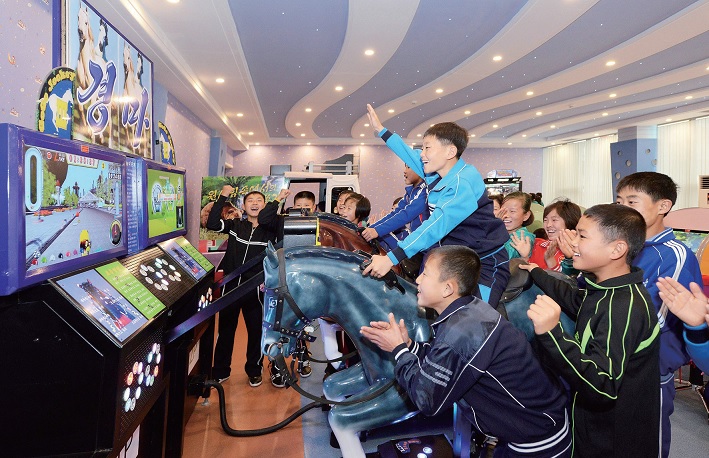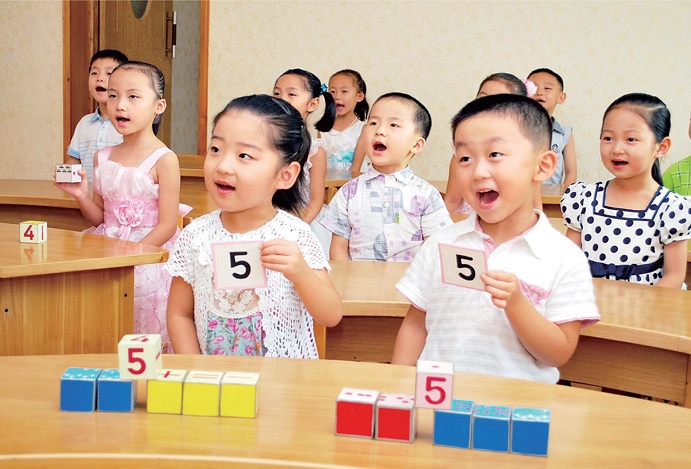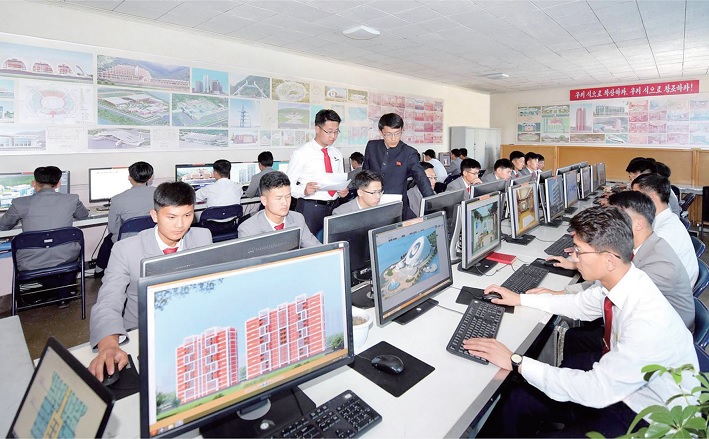教育與人才
教育與人才
Innovative System for Personnel Training

“Let us make a leap forward by dint of science and guarantee the future by dint of education!”–this is the slogan that catches your eye as you walk down the streets in the Democratic People’s Republic of Korea. This exemplifies the magnitude of the country’s policy on updating the education system and intensifying personnel training.
The pivot of the policy is to revamp the conditions and environment for teaching and raise its quality.
As widely known, a well-organized system of education is in place across the country. It traces its history back to 1956, when the universal compulsory primary education was introduced. Now it has developed into the universal free 12-year compulsory education, which consists of pre-school education for one year, primary education for five years and secondary education for six years.
Passing through these courses, students come to possess a perfect secondary knowledge and more than one technical skills. This education system is rated advanced in terms of period and quality.
Recently, the government has taken a series of substantial steps for upgrading the conditions and environment for education, while a social climate prevails for assisting educational institutions.
As part of an effort to increase the teachers’ practical ability and the quality of teaching, reasonable schemes are being adopted in the selection and training of teachers, and scientific methods of teaching are applied with a focus on enhancing the independence and creativity of students.
The universal 12-year compulsory education provides a sure guarantee for raising the cultural attainments and technical standards of the entire population and ensuring the sustainable development of society and the economy, especially for producing talented people.

Many Korean students brought honour to their country by winning top prizes at several international competitions, particularly at the International Maths Olympiad which is otherwise called “competition of brains for students worldwide.”
A typical example is the treble gold-medallist Hong Chung Song from Pyongyang Secondary School No. 1.
Given the fact that the Olympiad has produced ten or so treble gold-medallists, it is quite surprising that such a brilliant student was trained in the DPRK with a few years’ record of participation in this competition.
The chief of the advisory committee of the International Maths Olympiad commented: The DPRK is not big, yet it is challenging great powers in terms of intellectual faculty. Already, it is leading others in some fields. This shows that the country’s education system is excellent. In particular, its students have a profound knowledge of maths. Such gifted children will, no doubt, render a remarkable contribution to the scientific development of their country and beyond.
To cite another example, Korean students distinguished themselves at many international foreign language competitions.
Kim Jin Hyok won the top award at the 12th International Russian Olympiad for Students. He wrote a composition titled “My Questions to the Russian President,” in which he raised questions as to the Russian government’s view of the global environment and the conservation of the ecological system, as well as its plans for protecting them. The logical account of his own views and the responsibility of the international community aroused admiration among the judges.
Educationists of foreign countries were unstinting in their praise of the young students, calling the DPRK a land of brilliant people and eulogizing its educational level.
Teaching in such fields as music, fine art and sports is also up to international standard. A well-regulated system has been set up for identifying and training children with a flair for art. It is said that they usually receive pre-school specialist training for one year or in exceptional cases, from the age of 3 or 4. Thanks to such training courses, you can see “little musicians,” “little sports stars” and “little artists” anywhere you may go in the country.
Among the music prodigies are Ma Sin A, Choe Jang Hung, Yu Pyol Mi, Ri Yu Jong, Jong Yong Ju, Kim Pu Gang, Han Il Yong and Choe Ji Ye, who won special or top prizes at several international piano contests. Gymnast Kim Kwang Suk and judoist Kye Sun Hui are world-famous champions.
With an army of talented specialists multiplying under its advantageous education system, the DPRK will soon attain its ambitious goal of scientific development.

Source: Consulate General of the Democratic People's Republic of Korea in Hong Kong





